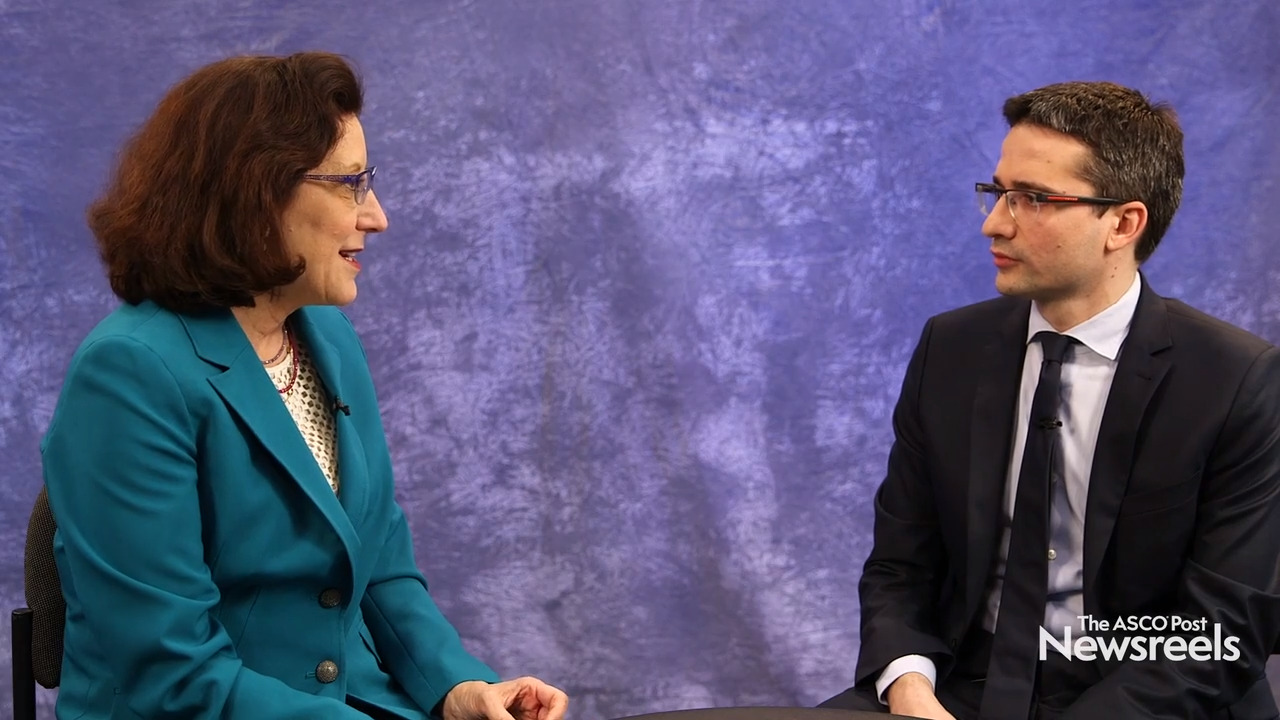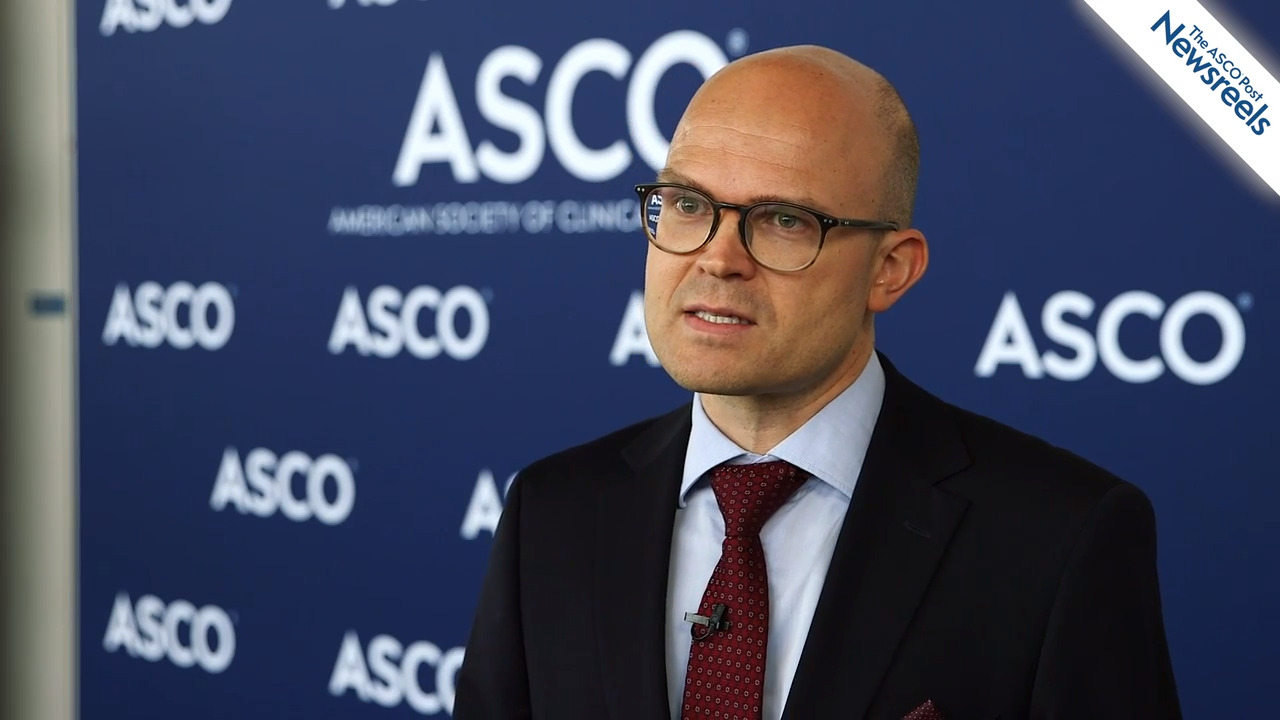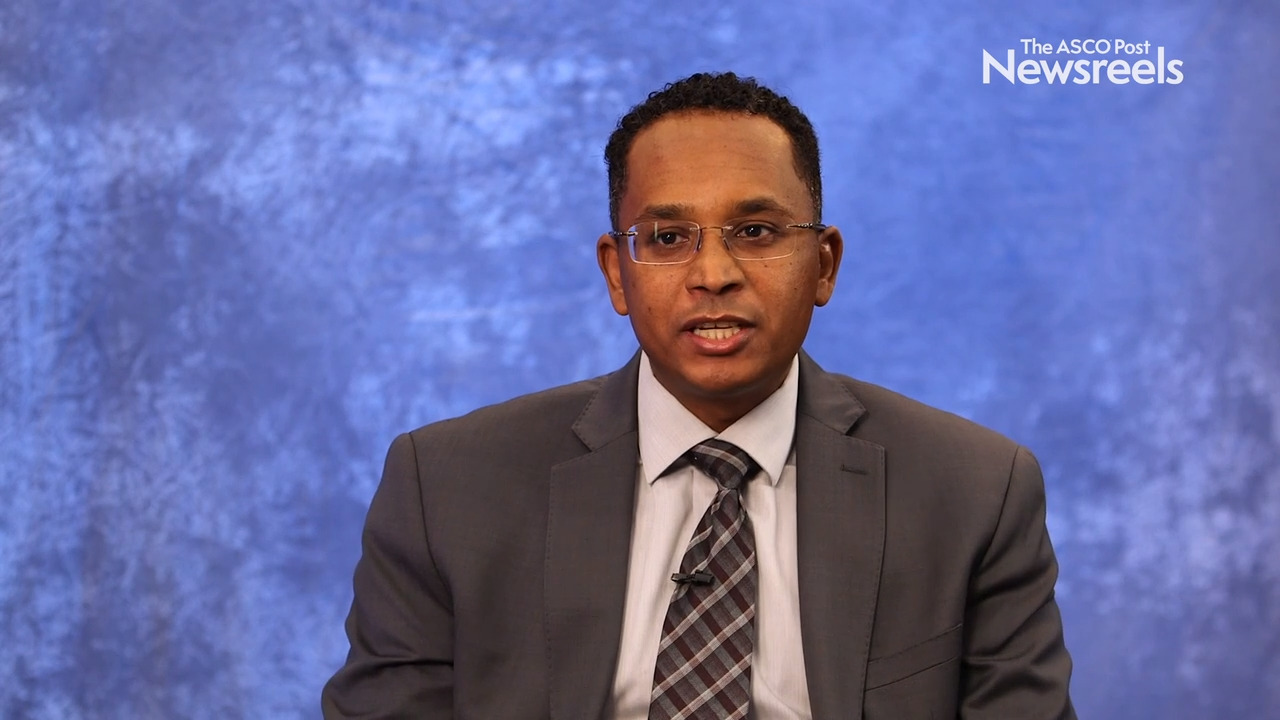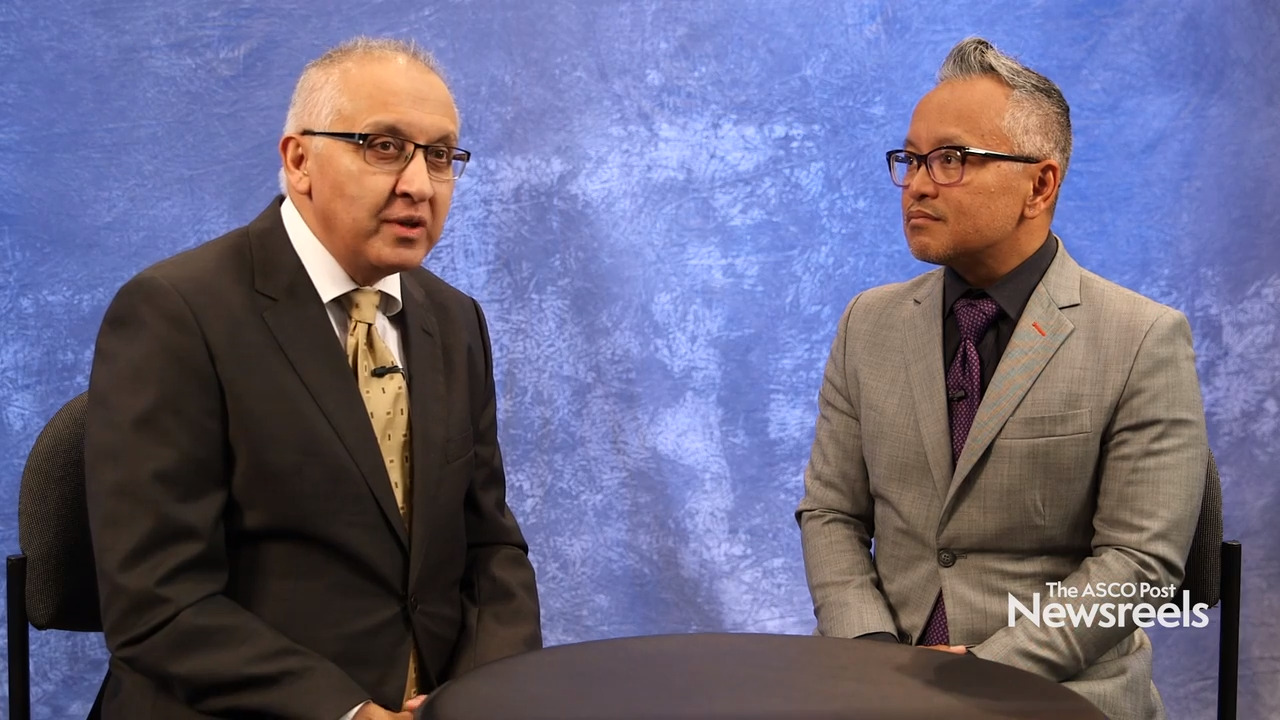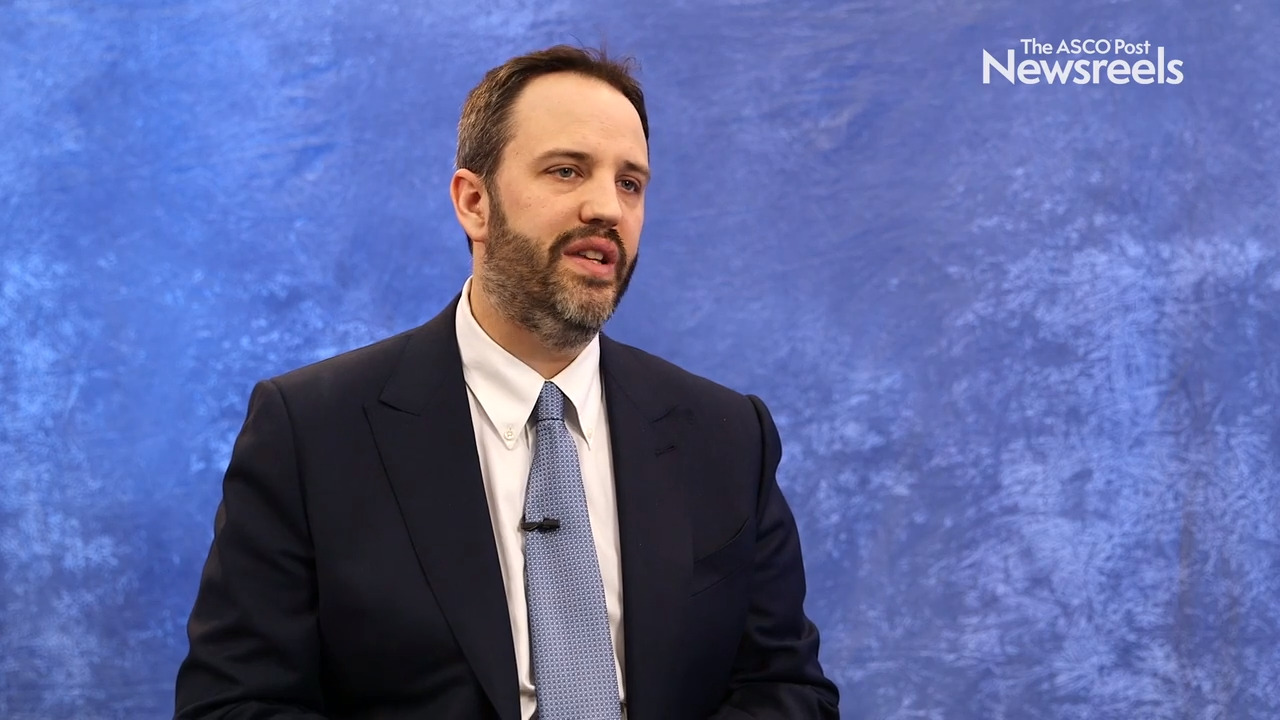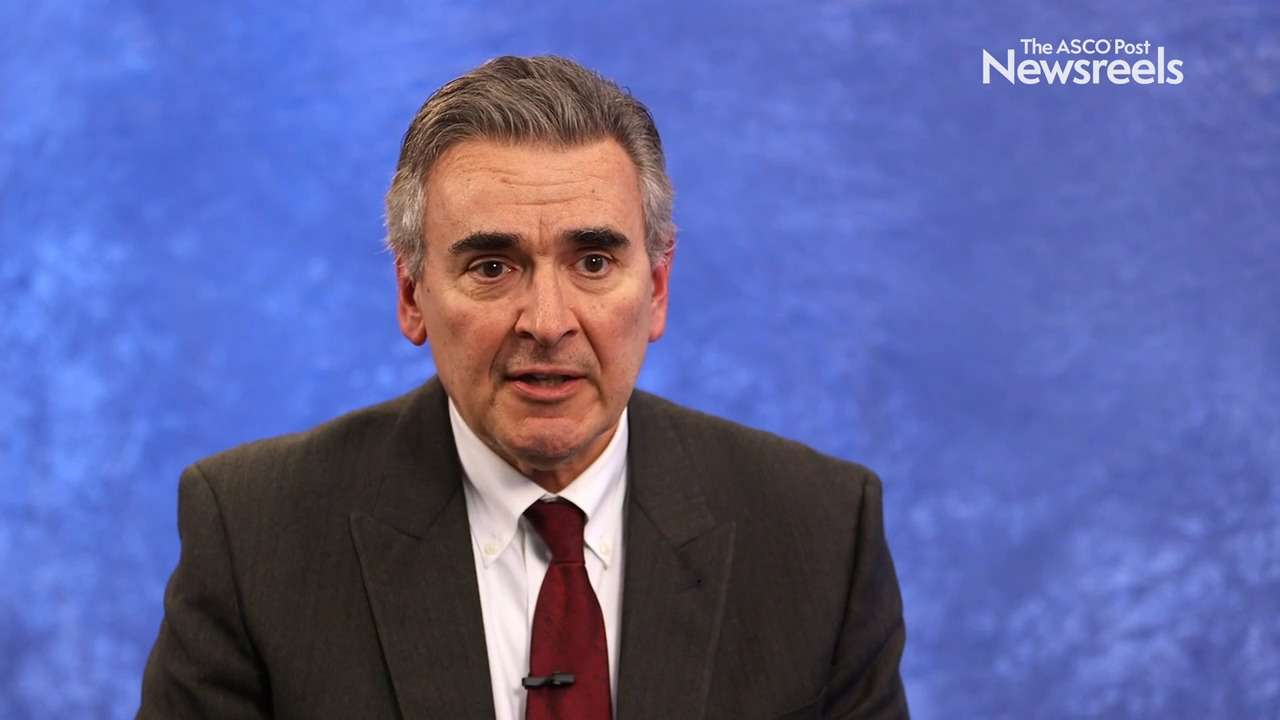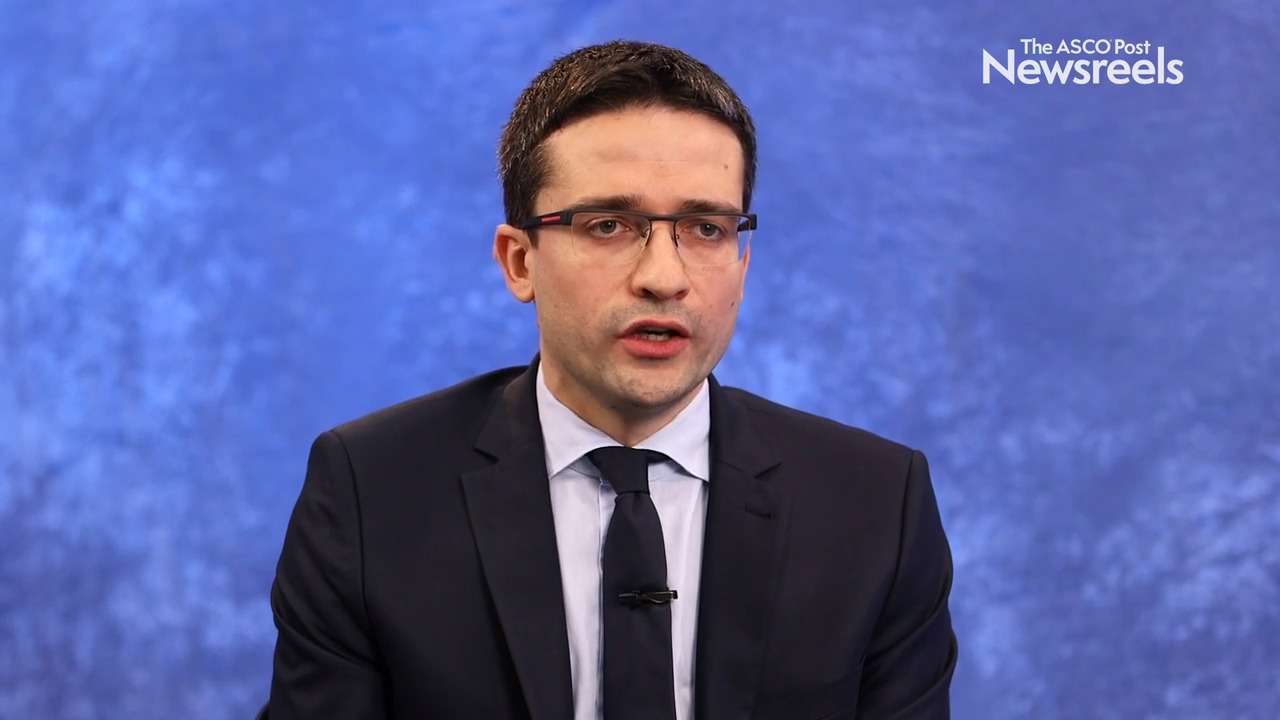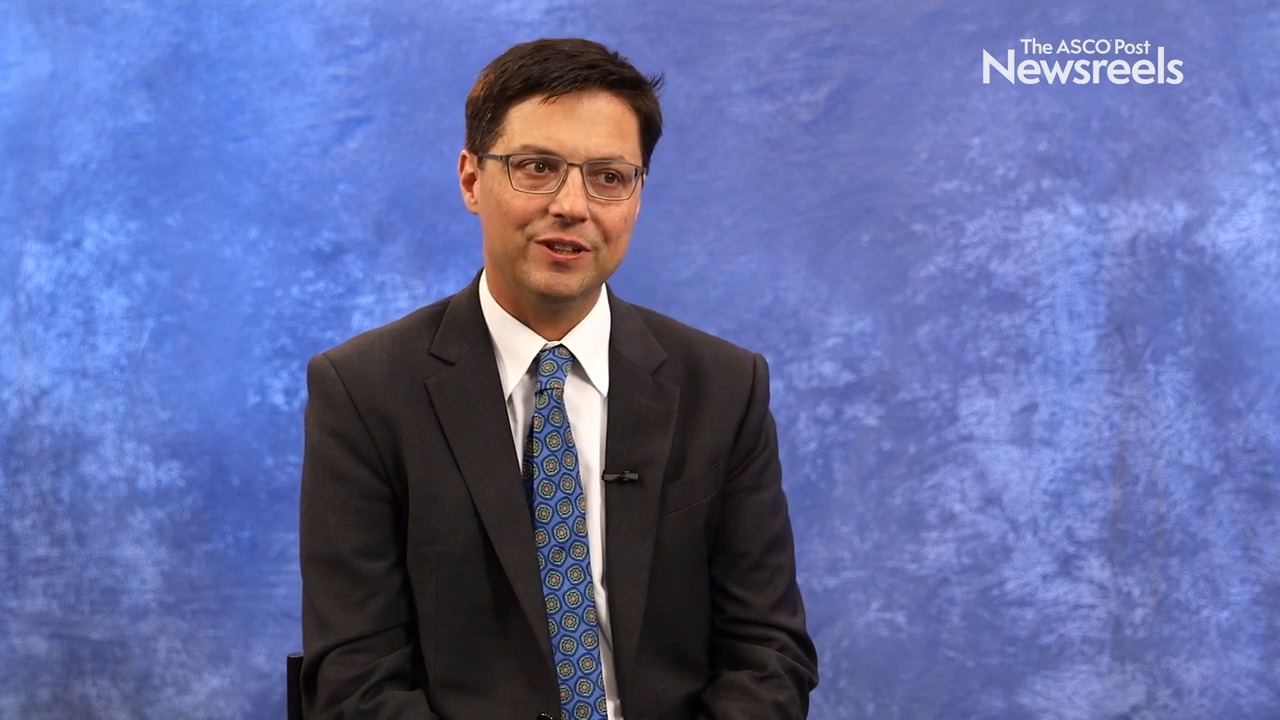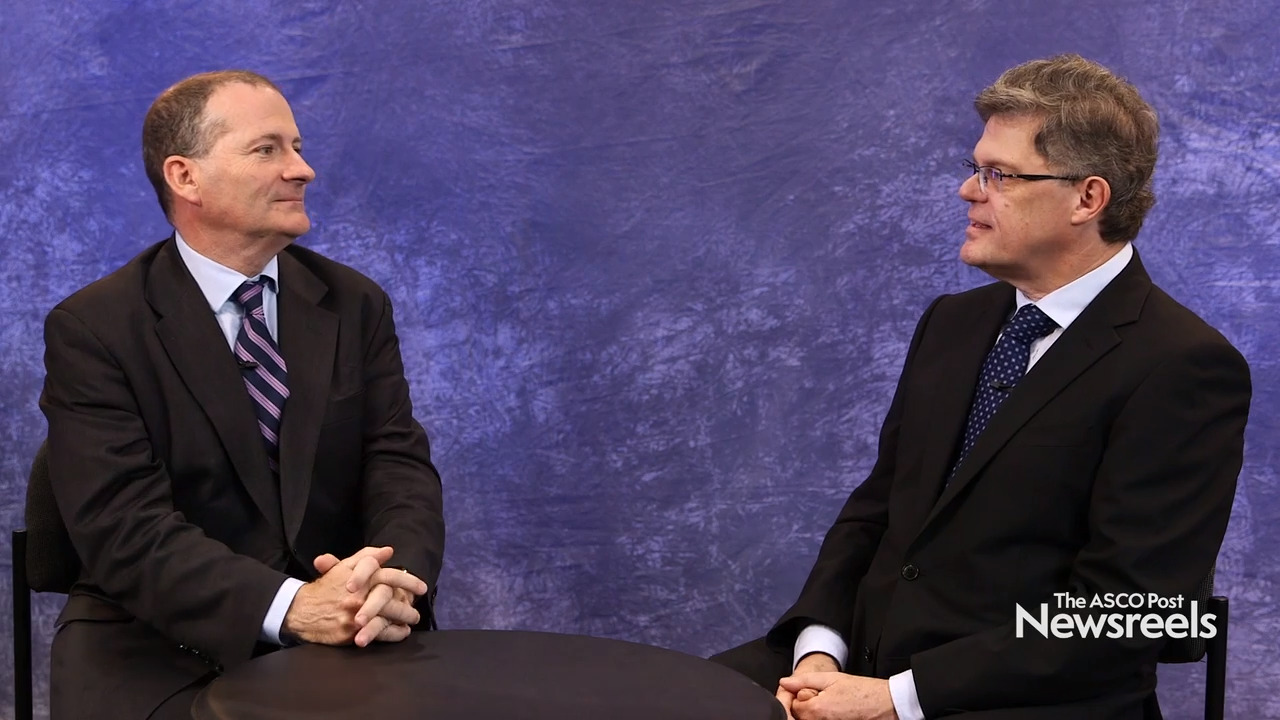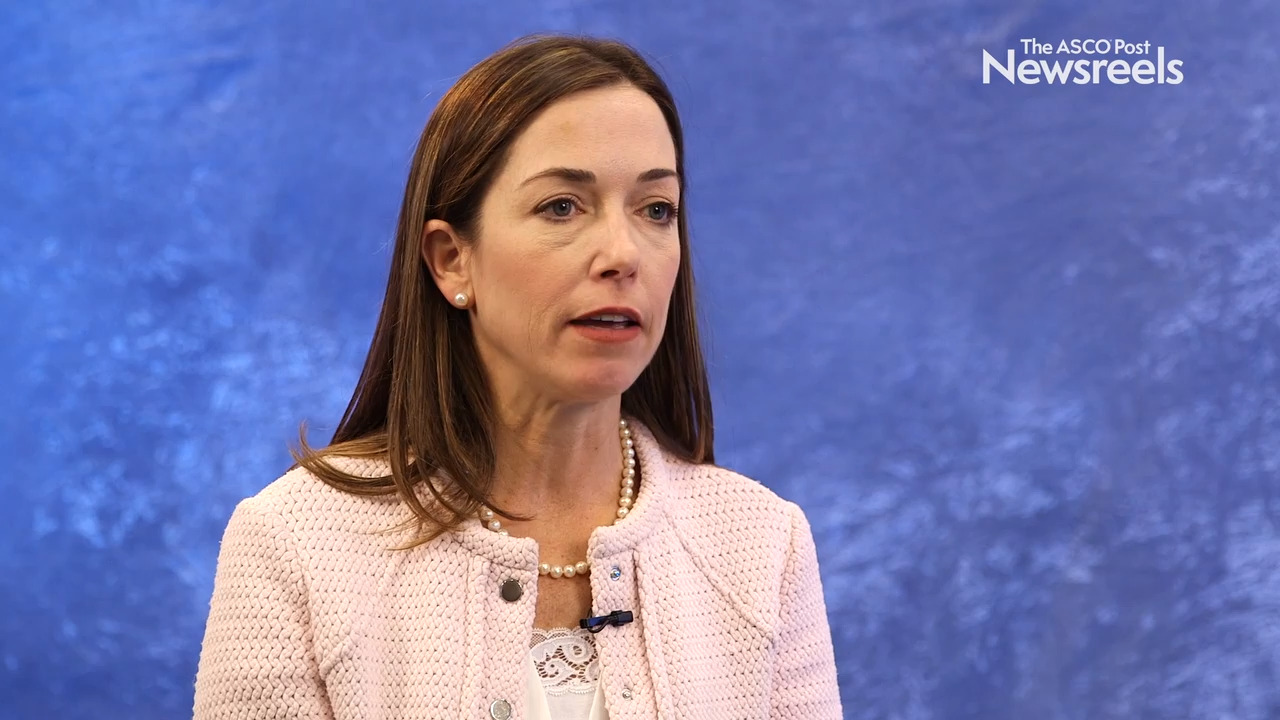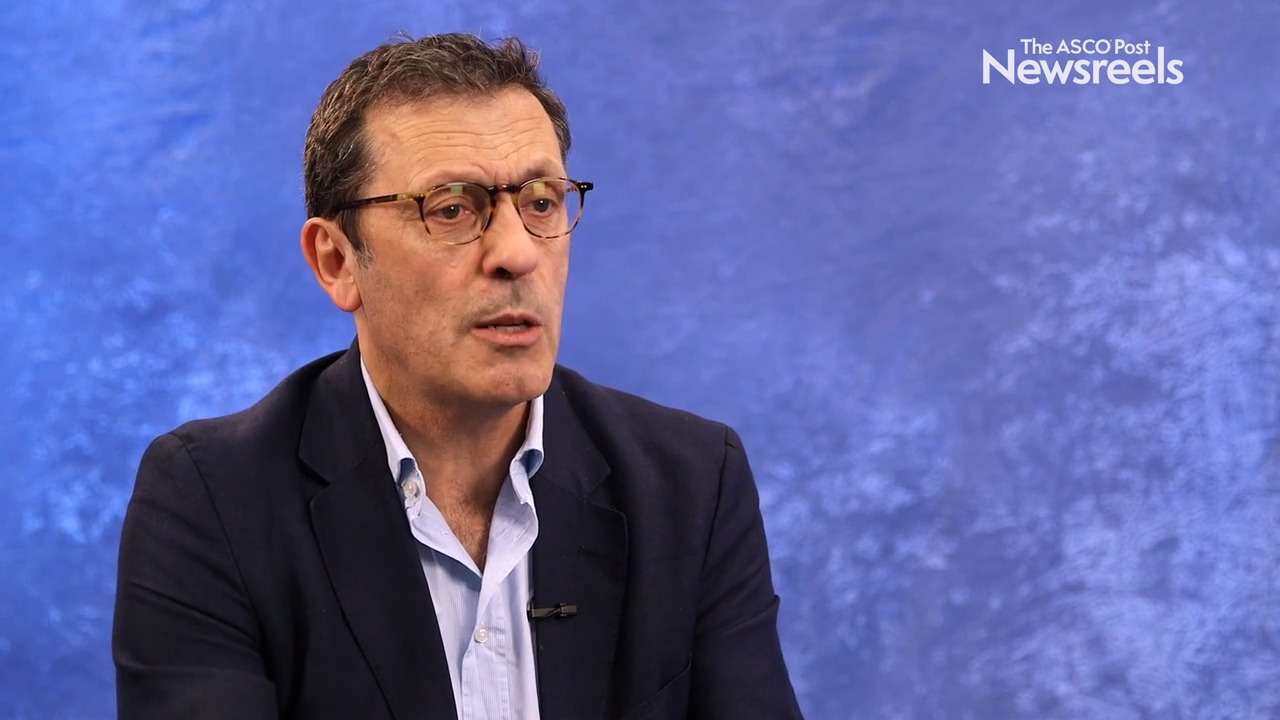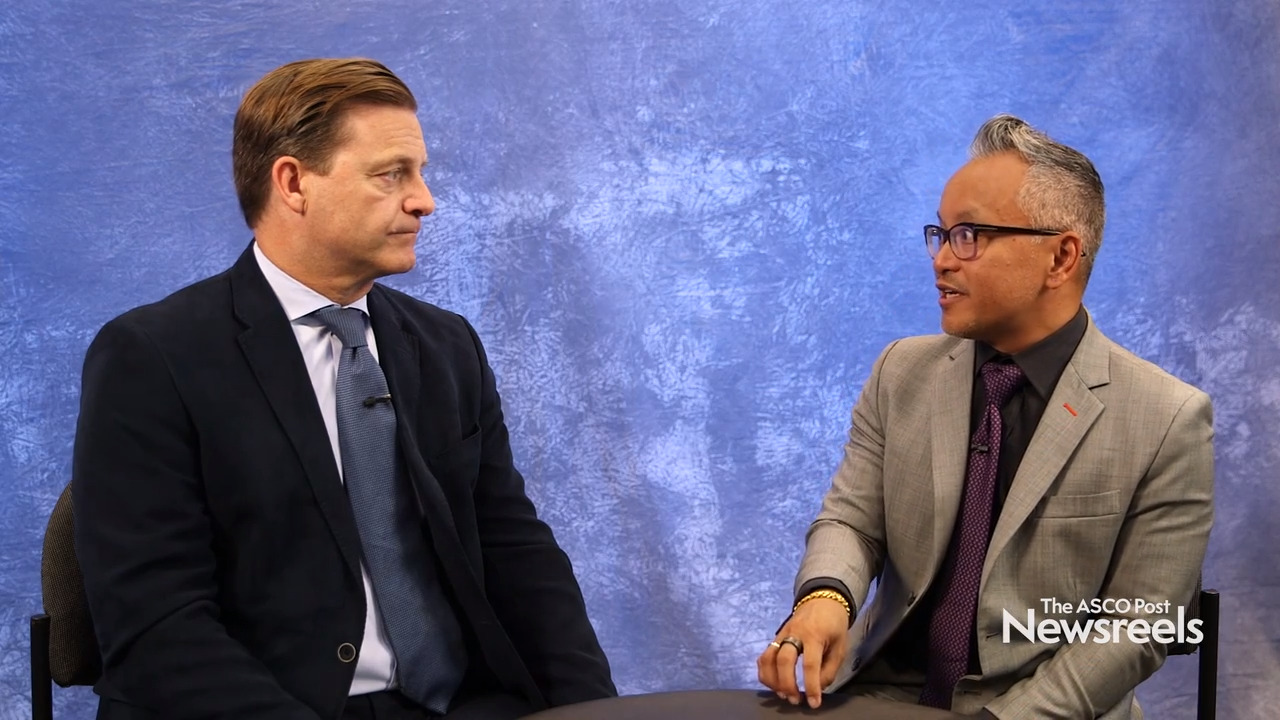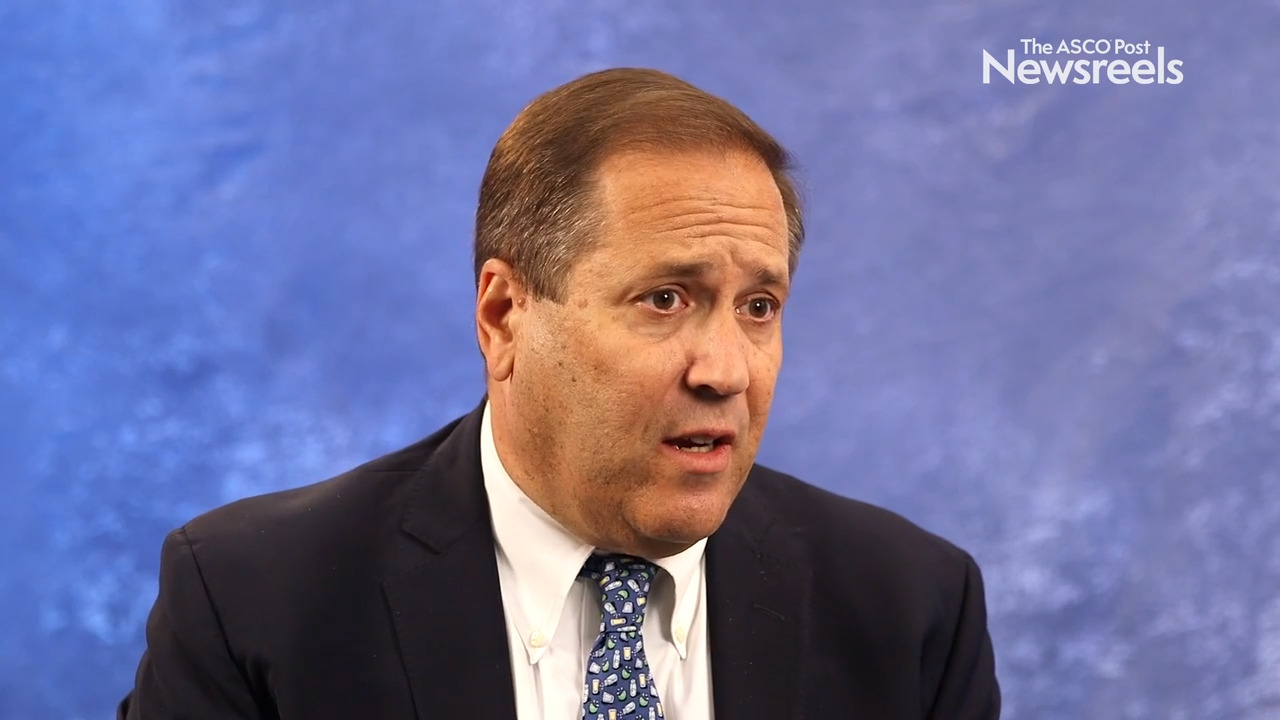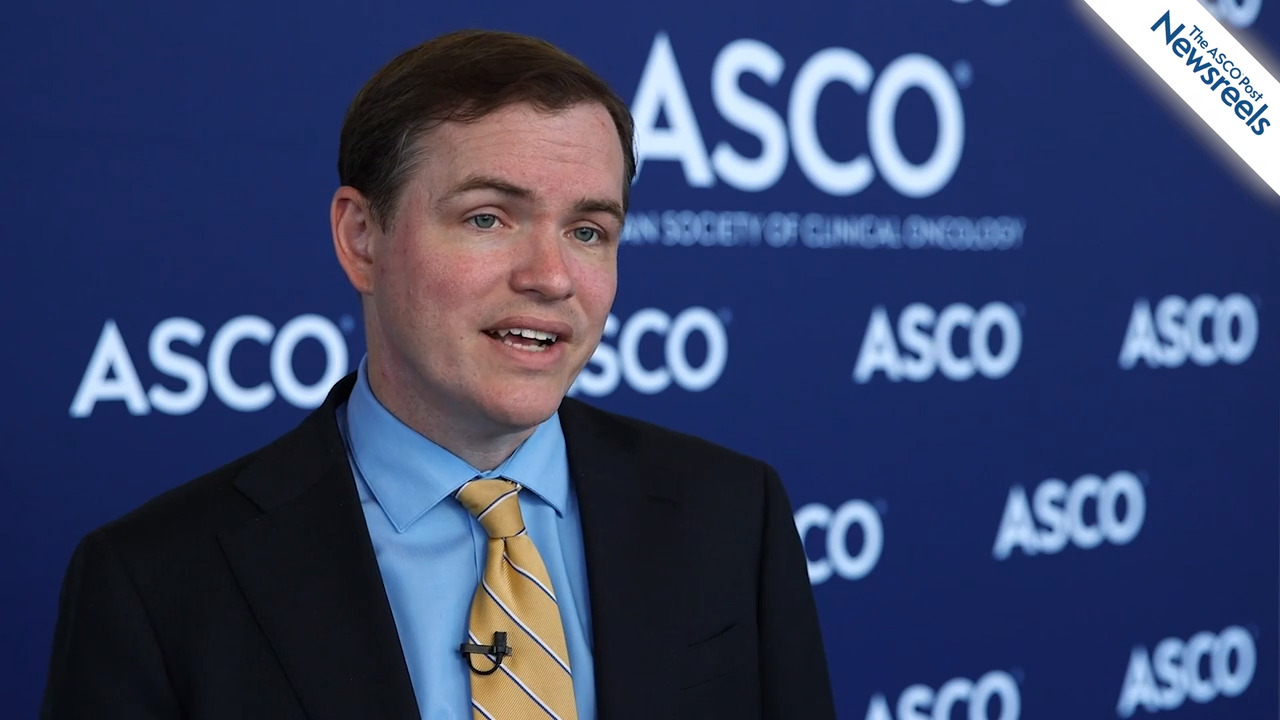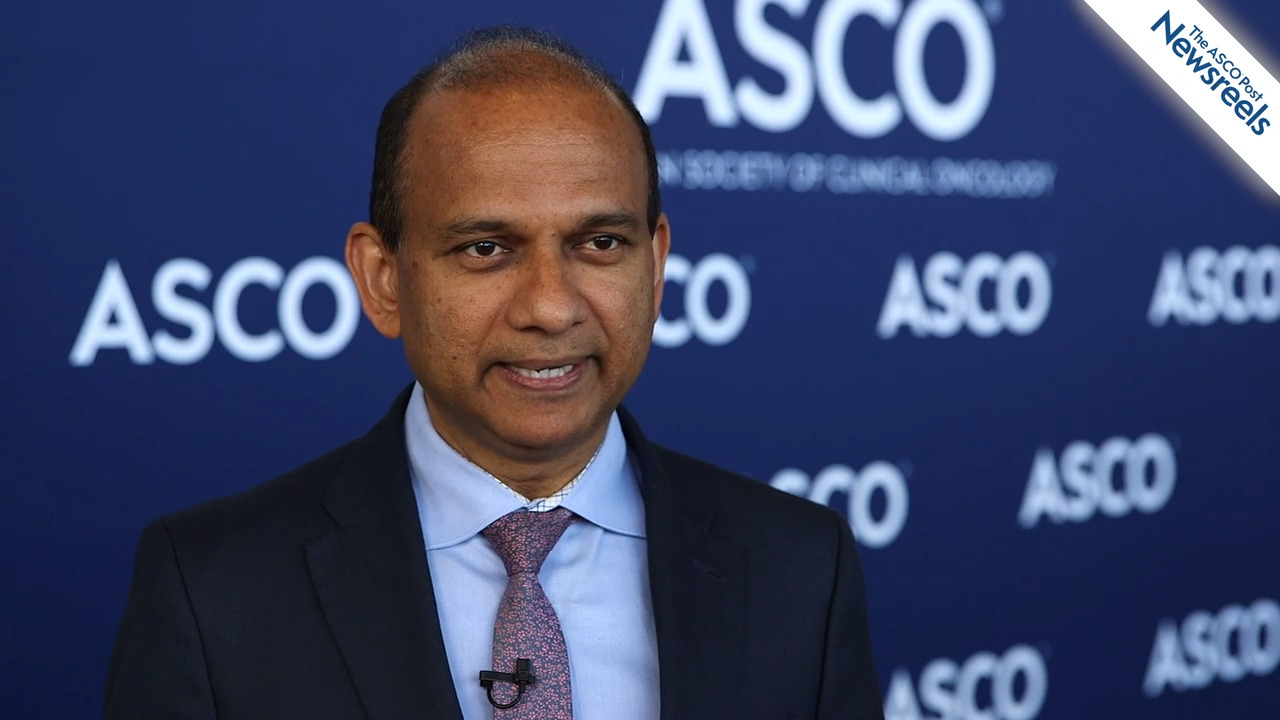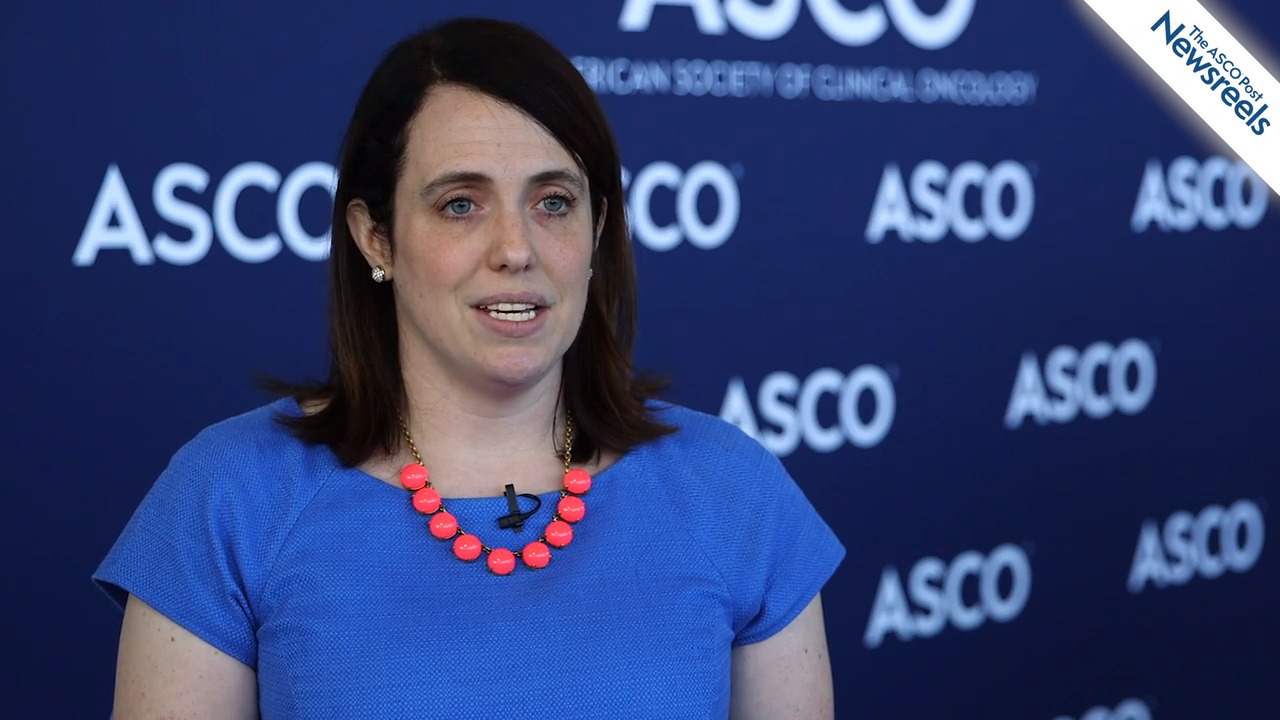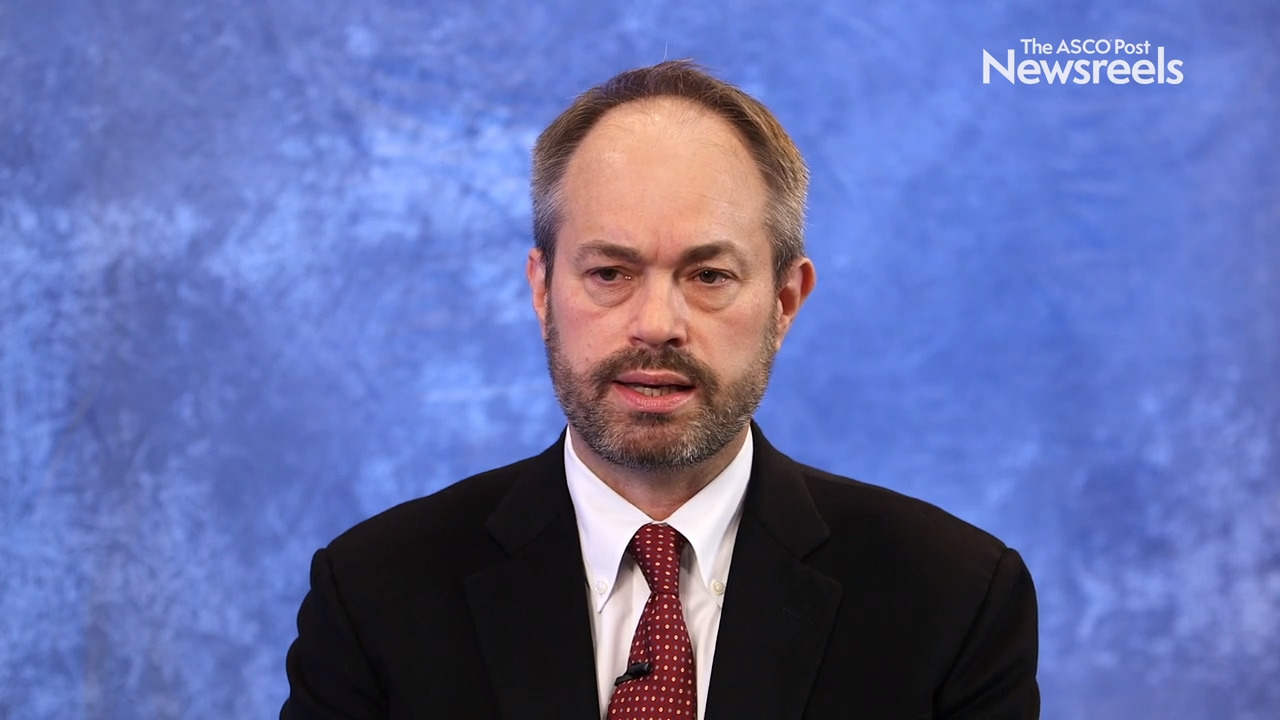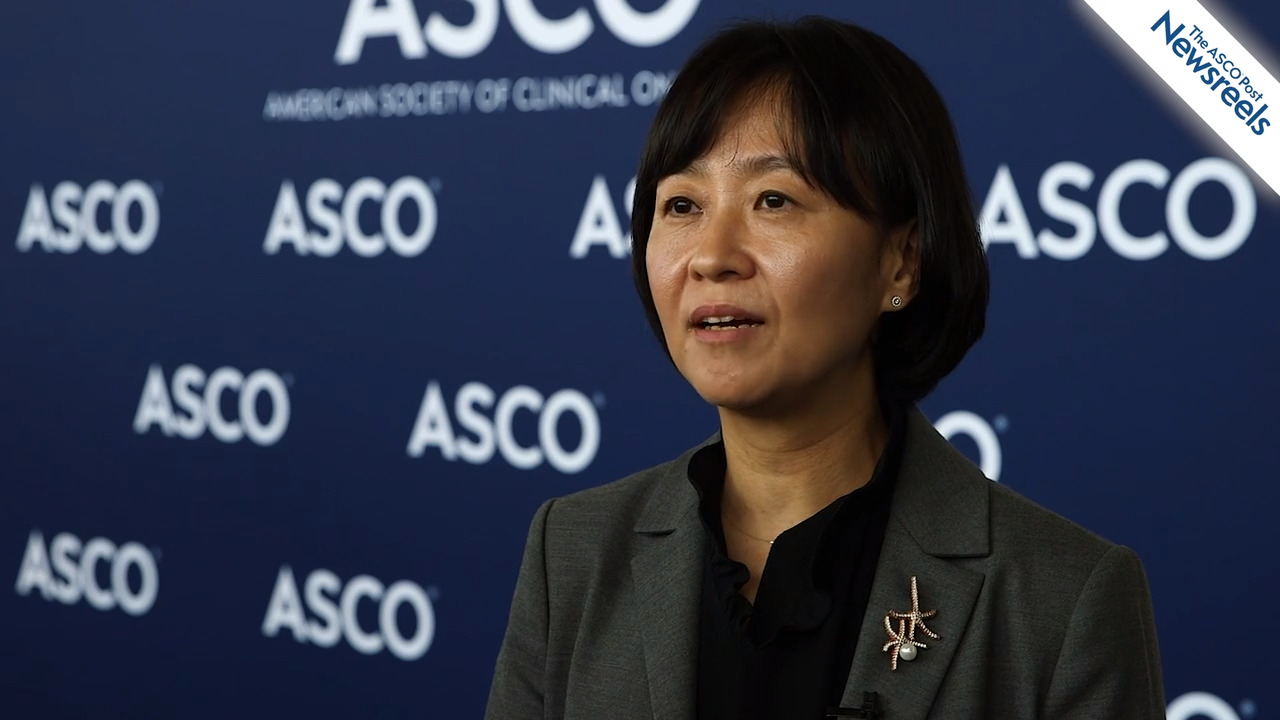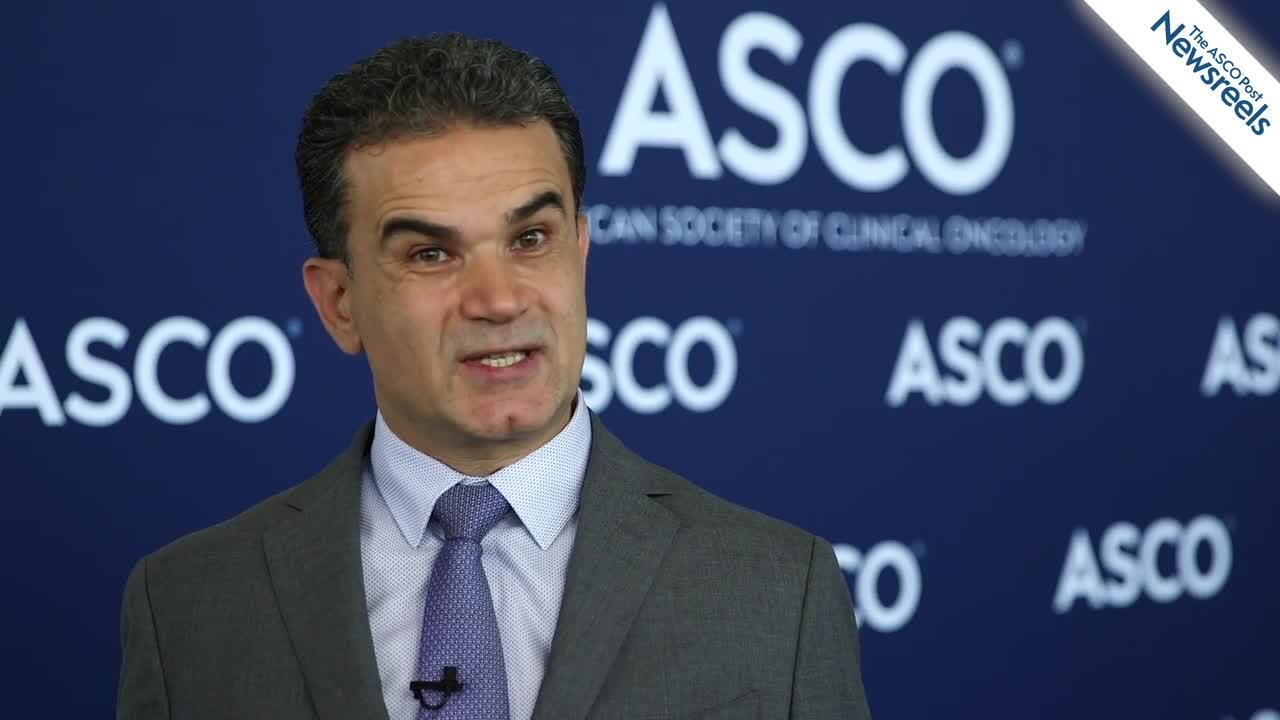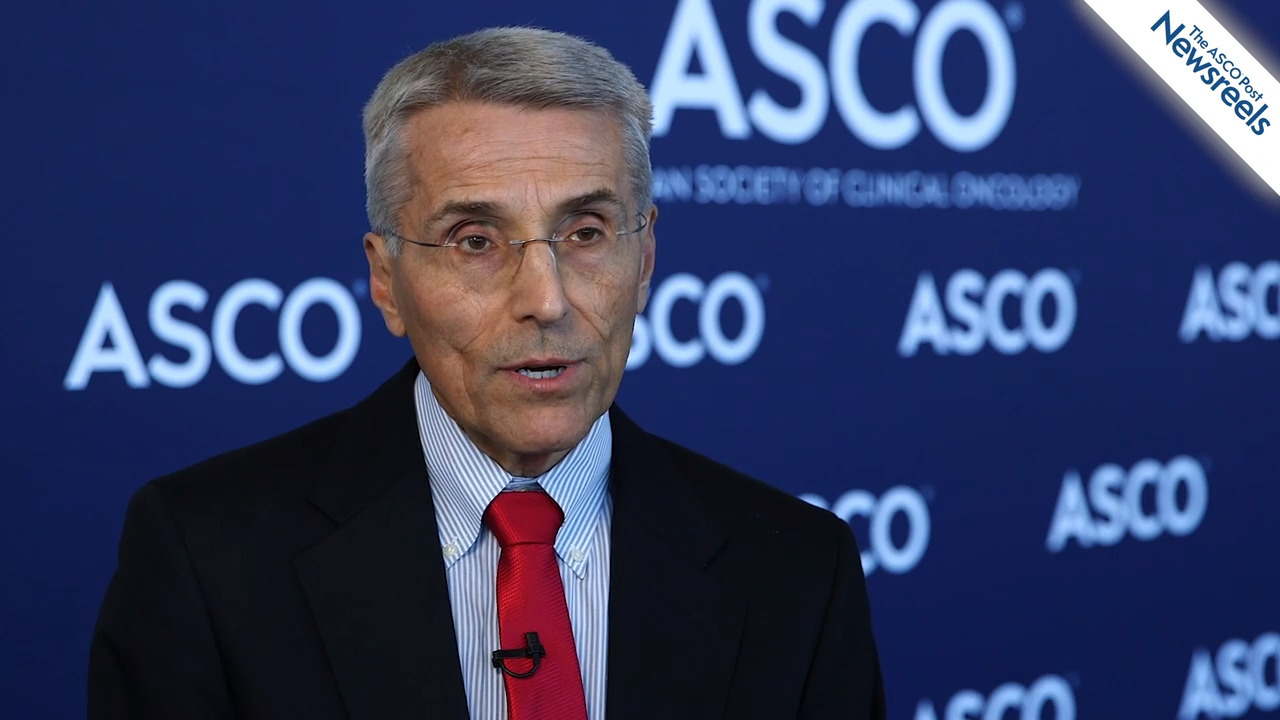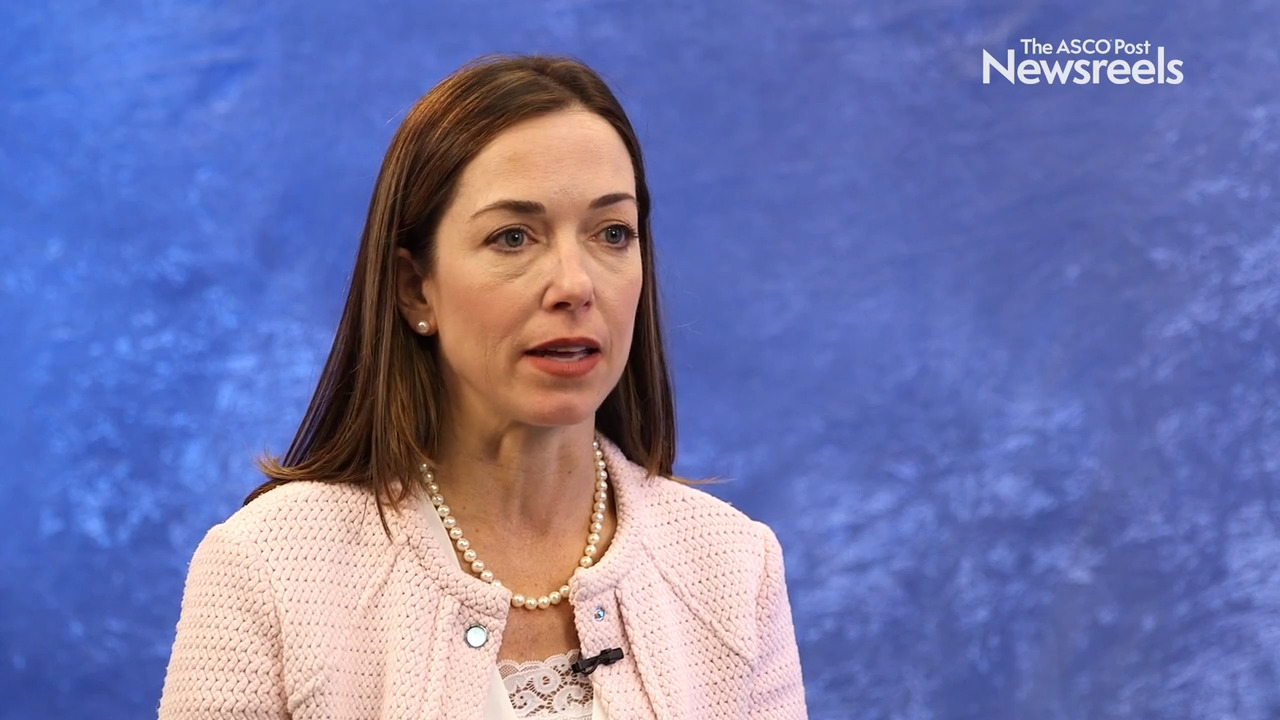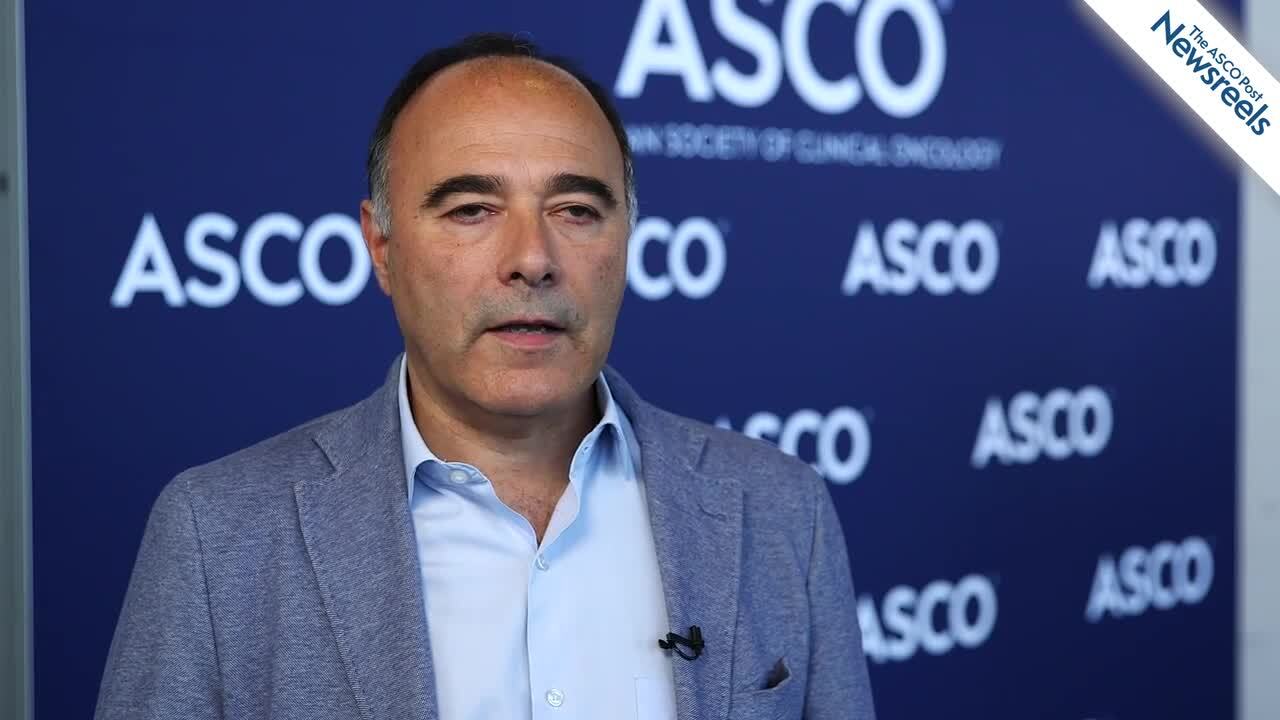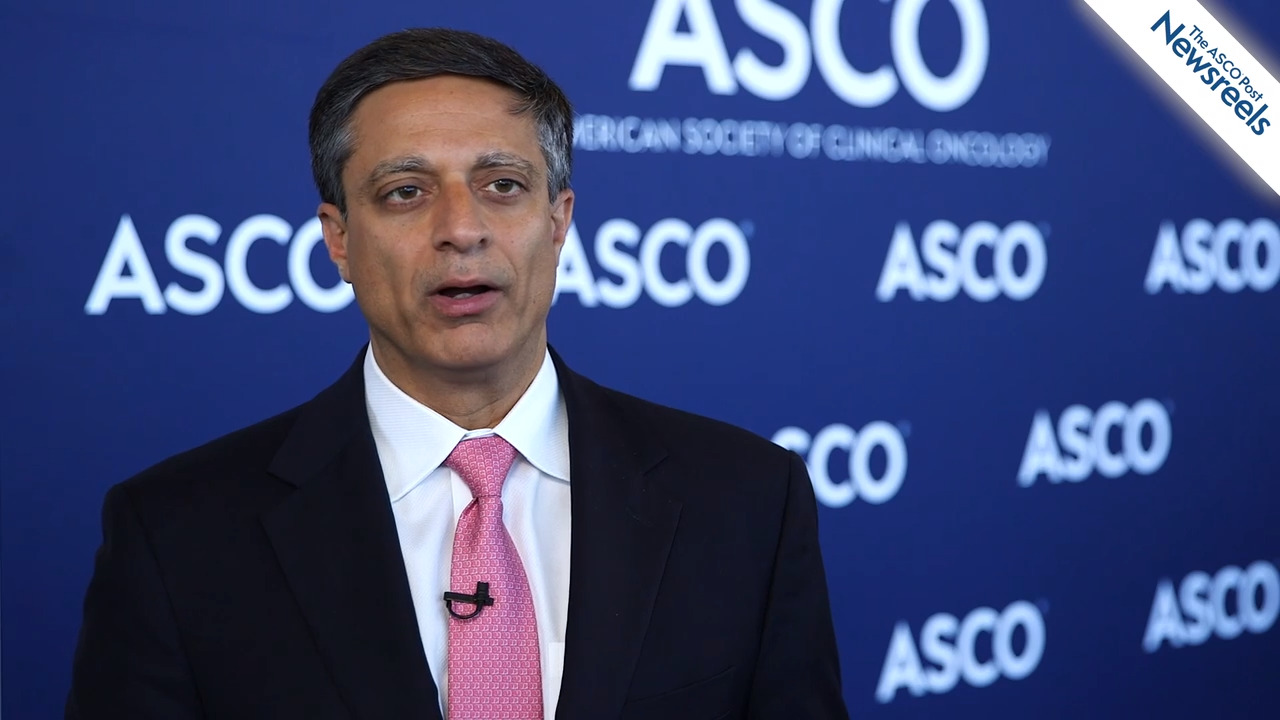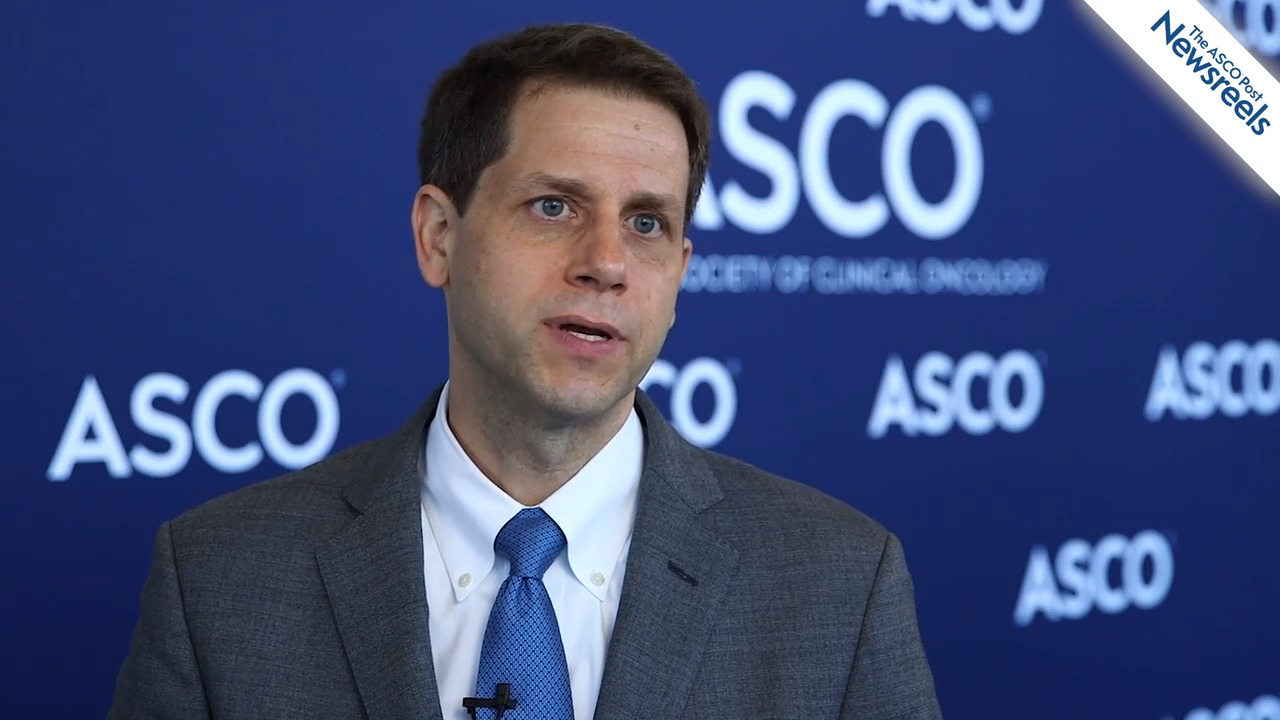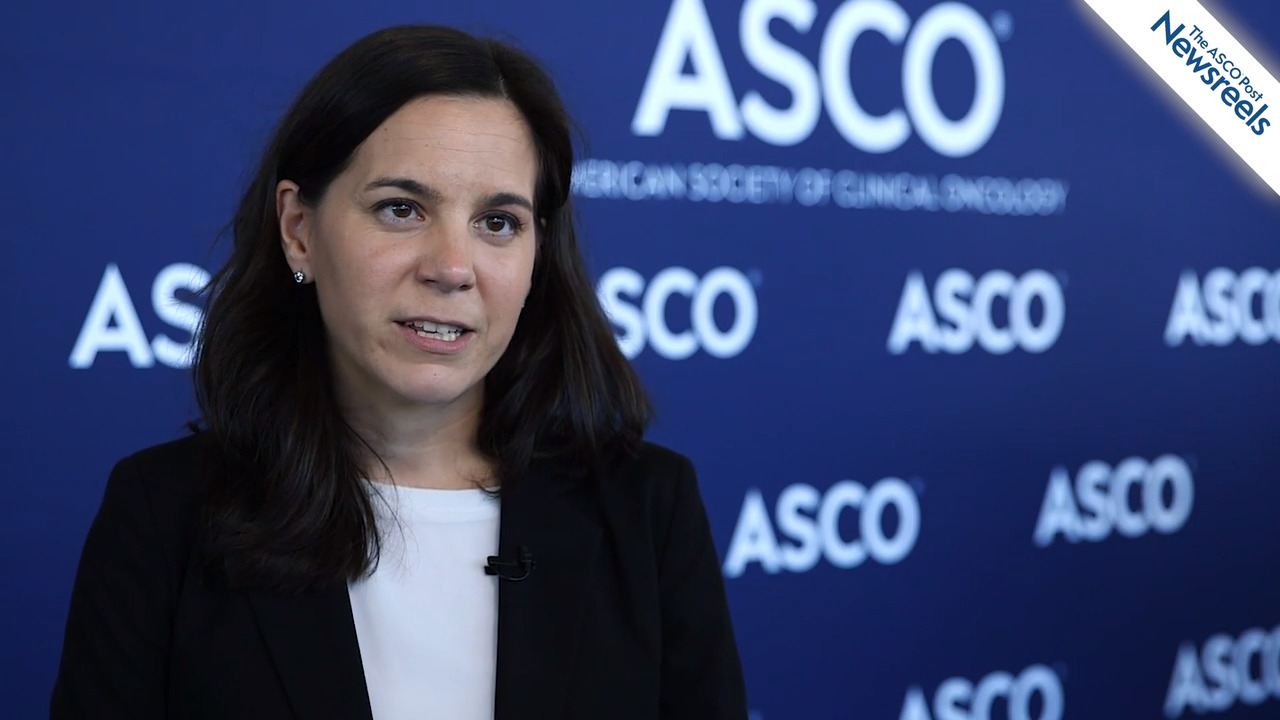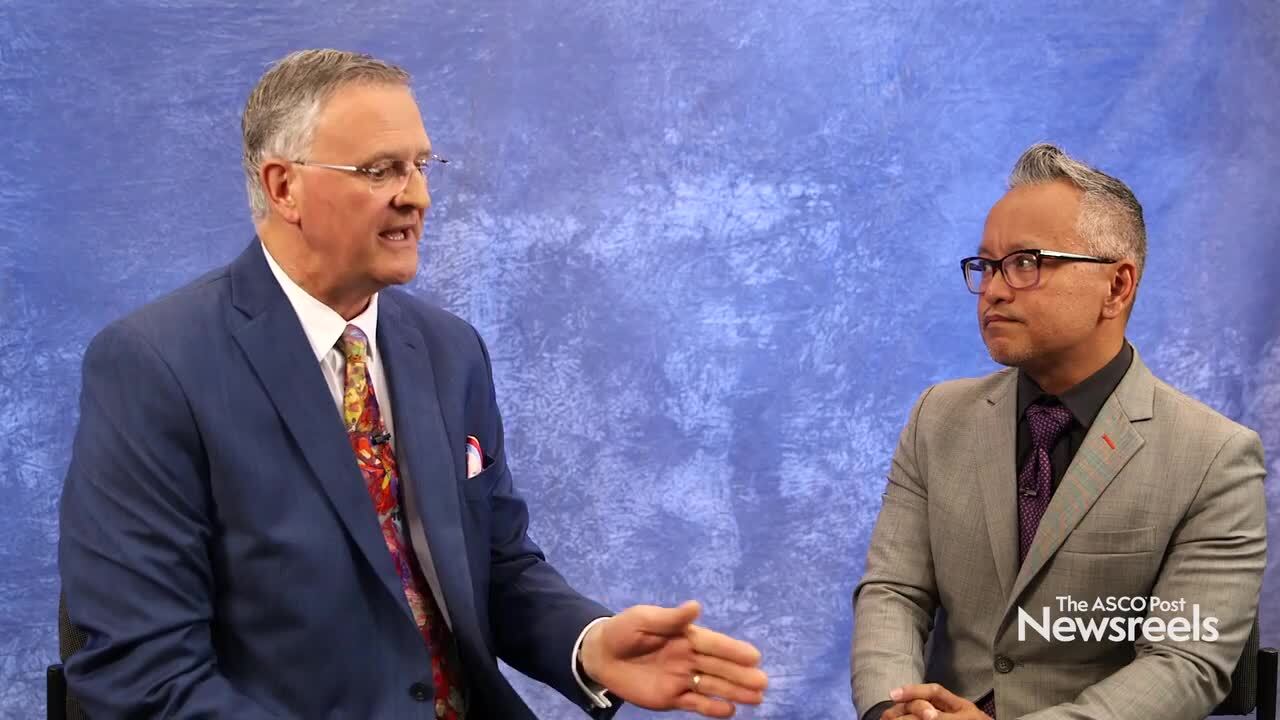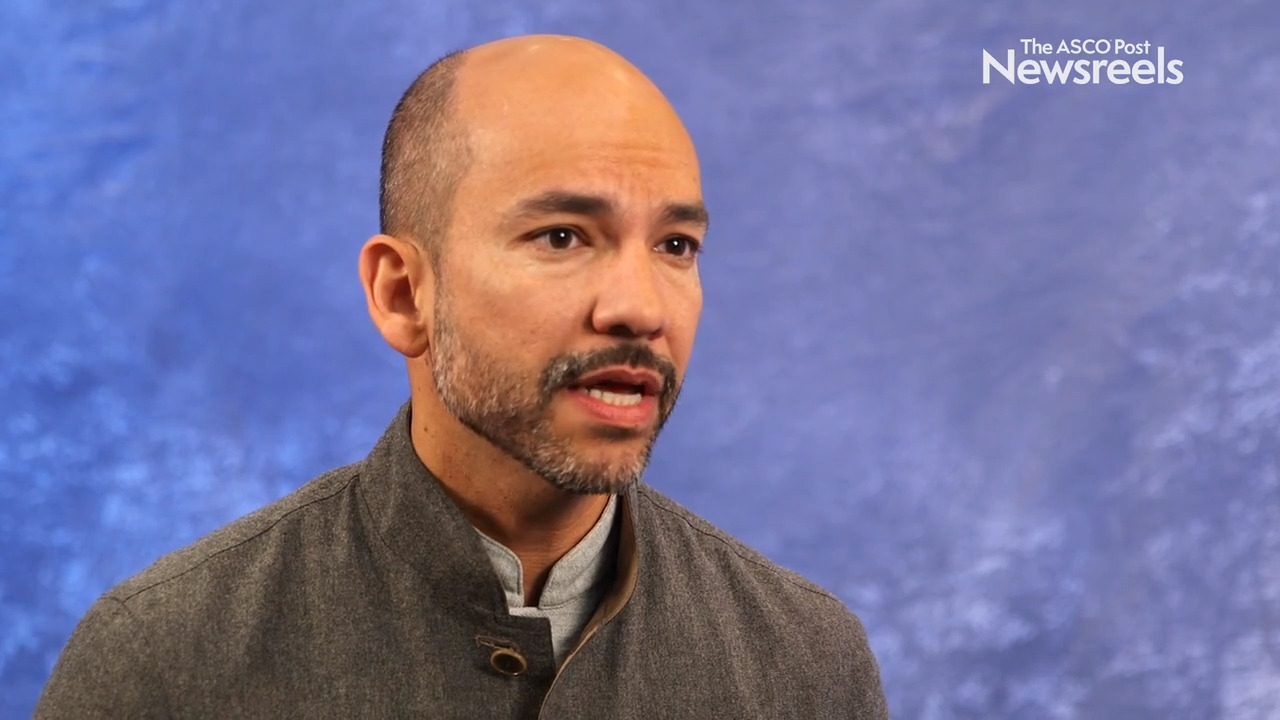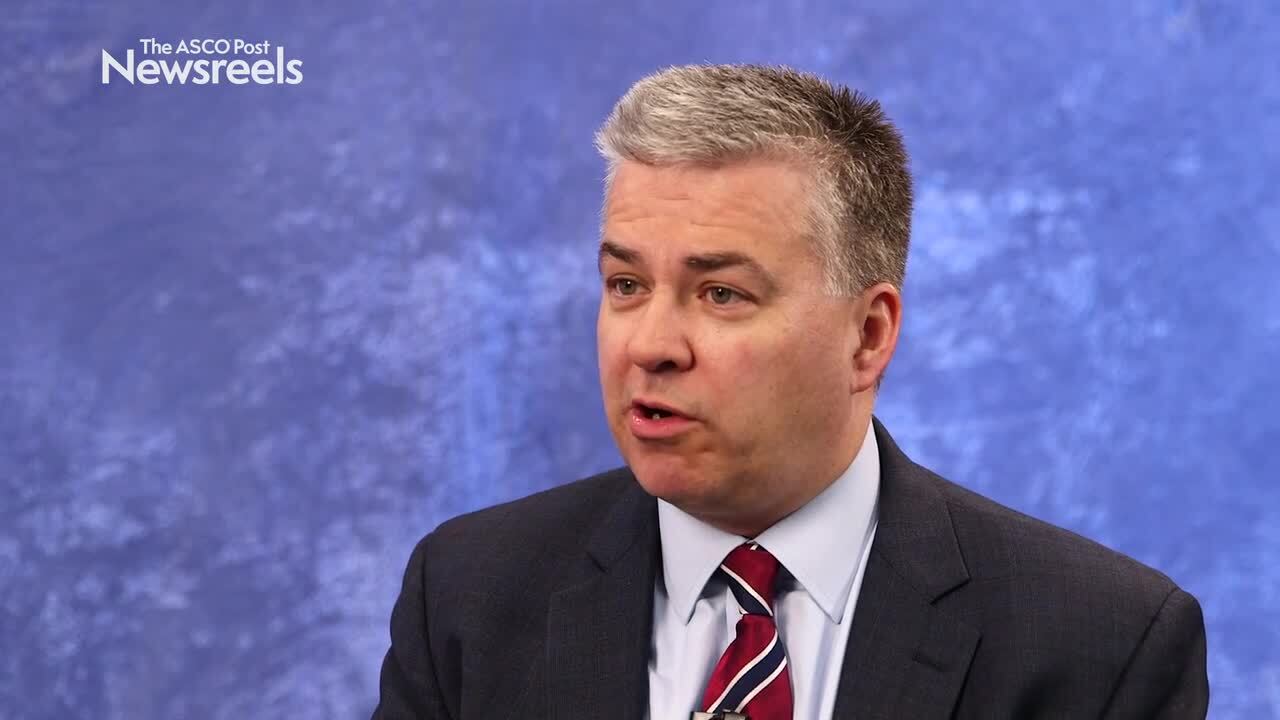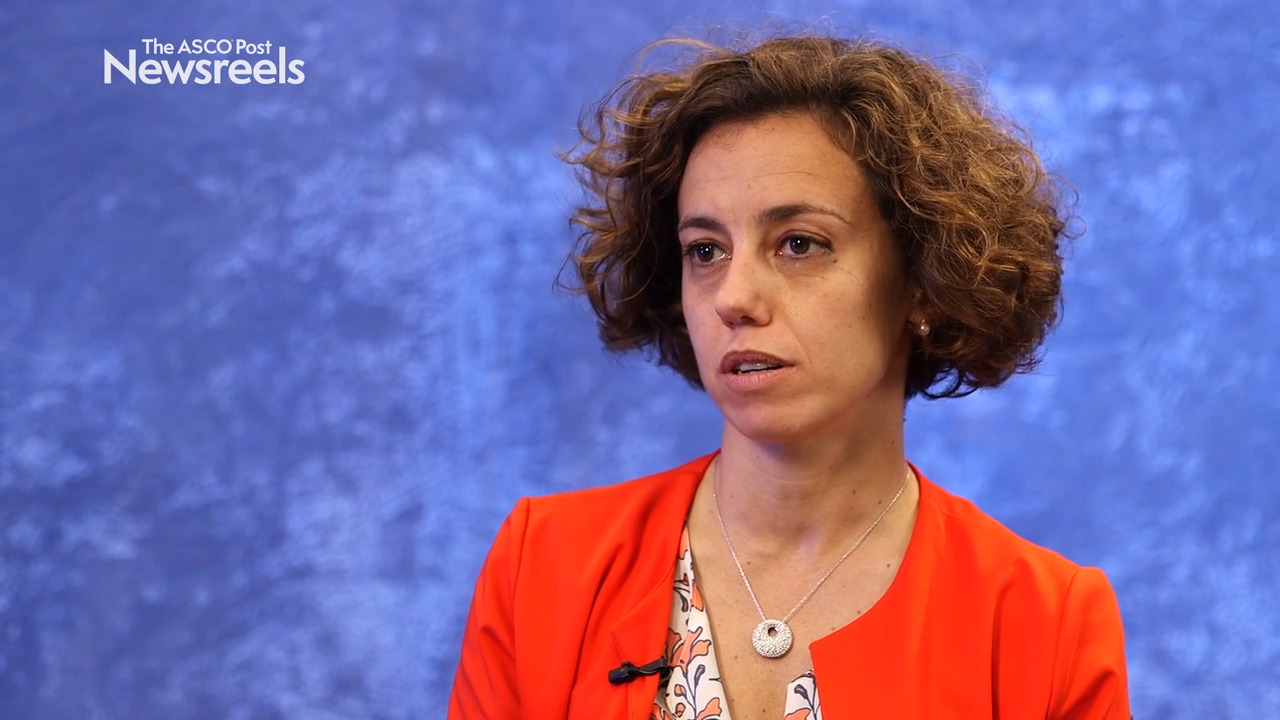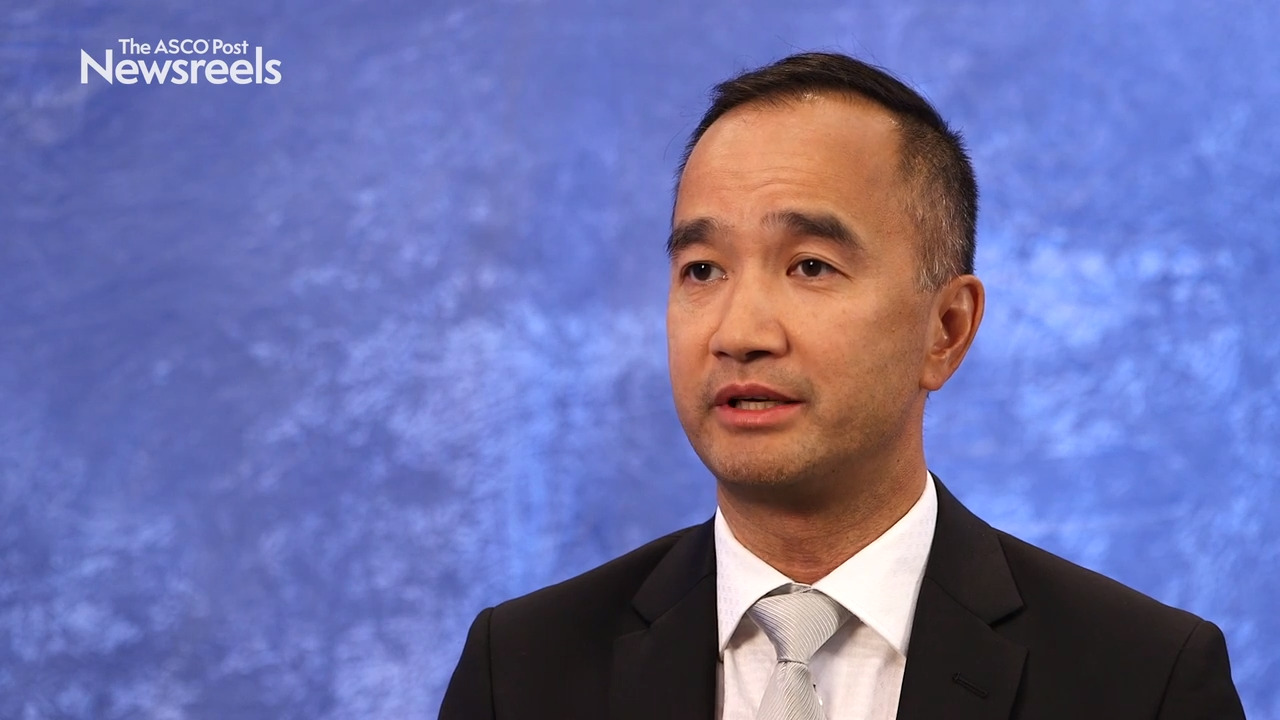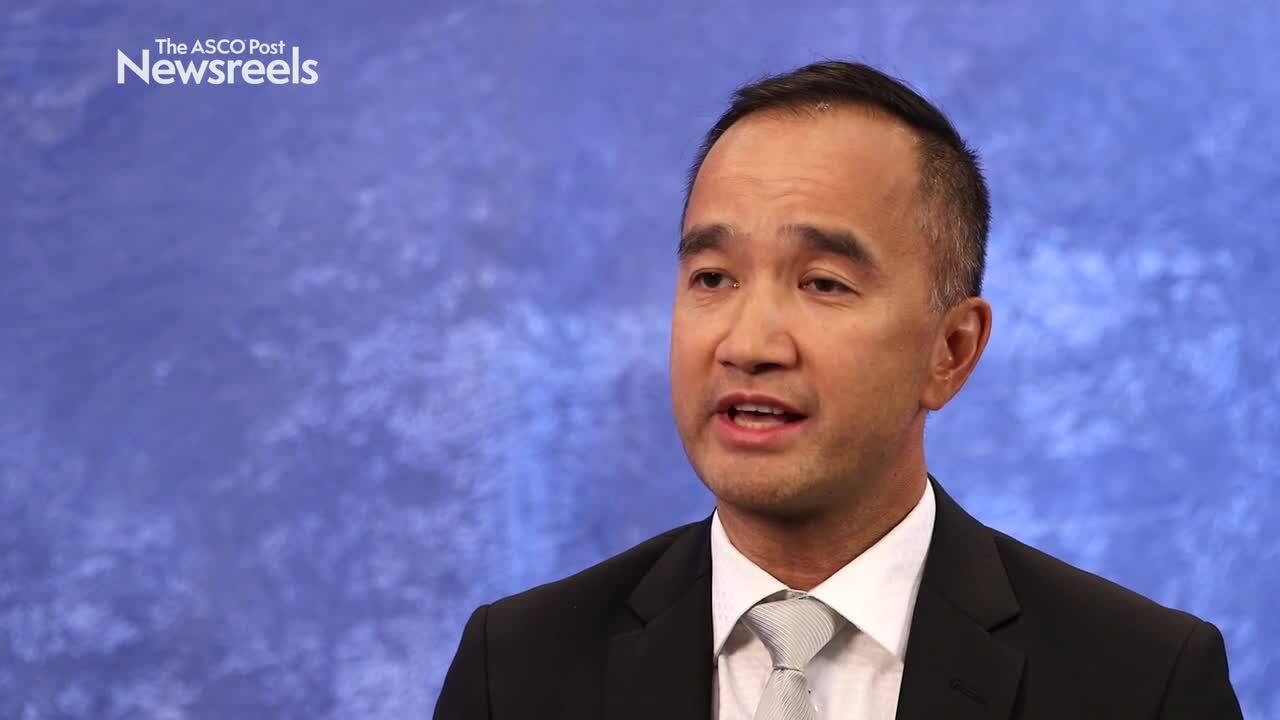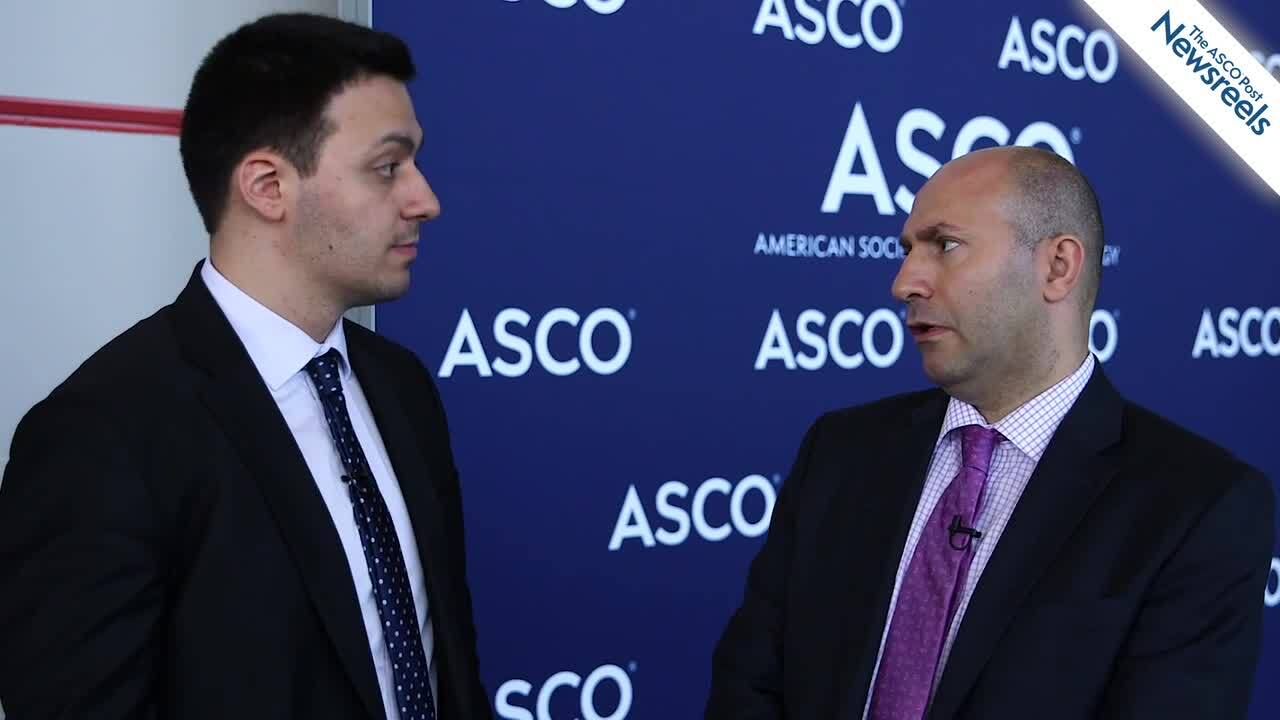2019 ASCO Annual Meeting
2019 ASCO: No Benefit From Pazopanib in Advanced Renal Cell Carcinoma After Metastasectomy
The E2810 trial was conducted to determine whether treatment with the oral drug pazopanib following surgery to remove further metastases in patients with advanced renal cell carcinoma would improve th...
2019 ASCO: Addition of Veliparib to Total Neoadjuvant Therapy in Locally Advanced Rectal Cancer
Results from an experimental arm of the phase II NRG-GI002 trial using veliparib, a poly (ADP-ribose) polymerase (PARP) inhibitor, as part of total neoadjuvant therapy (induction chemotherapy followed...
Hope S. Rugo, MD, and Matteo Lambertini, MD, PhD, on the SOPHIA Trial in HER2-Positive Metastatic Breast Cancer: Chemotherapy Plus Margetuximab vs Trastuzumab
Matteo Lambertini, MD, PhD, of the University of Genova and Policlinico San Martino Hospital, and Hope S. Rugo, MD, of the University of California, San Francisco, discuss findings from the SOPHIA tri...
Åsmund A. Fretland, MD, on Colorectal Cancer Liver Metastases: Laparoscopic vs Open Resection
Åsmund A. Fretland, MD, of Oslo University Hospital, discusses clinical trial findings on survival outcomes after laparoscopic vs open resection for colorectal liver metastases. The study he conducted...
Hani M. Babiker, MD, on Tumor Treating Fields: A Different Approach to Therapy
Hani M. Babiker, MD, of the The University of Arizona, discusses an emerging treatment that inhibits the mitotic spindle and disrupts tumor cell growth. The method has been approved by the FDA to trea...
Mansoor Raza Mirza, MD, and Don S. Dizon, MD, on Recurrent Platinum-Sensitive Ovarian Cancer: Niraparib Plus Bevacizumab
Don S. Dizon, MD, of the Lifespan Cancer Institute, and Mansoor Raza Mirza, MD, of Copenhagen University Hospital, discuss study findings that showed, compared with niraparib alone, niraparib plus bev...
Justin F. Gainor, MD, on Non–Small Cell Lung Cancer: Clinical Activity and Tolerability of Selective RET Inhibitor
Justin F. Gainor, MD, of Massachusetts General Hospital, discusses updated findings from the ARROW study in which BLU-667, a selective RET inhibitor, demonstrated clinical activity and tolerability in...
Joseph A. Sparano, MD, on Early Breast Cancer: Predicting Prognosis and Treatment Benefit in TAILORx
Joseph A. Sparano, MD, of the Montefiore Medical Center and Albert Einstein Cancer Center, discusses how clinical risk stratification provides additional prognostic information to the 21-gene recurren...
Matteo Lambertini, MD, PhD, on Safety of Pregnancy After Treatment for BRCA-Mutated Breast Cancer
Matteo Lambertini, MD, PhD, of the University of Genova and Policlinico San Martino Hospital, discusses data from an international cohort study on counseling women with breast cancer who have a BRCA m...
Leonard J. Appleman, MD, PhD, on Metastatic Renal Cell Carcinoma: Pazopanib vs Placebo After Metastasectomy
Leonard J. Appleman, MD, PhD, of UPMC Hillman Cancer Center, discusses phase III trial findings that showed a trend toward worse survival with pazopanib in patients with metastatic kidney cancer who e...
Christopher Sweeney, MBBS, and Ian D. Davis, MBBS, PhD, on ANZUP: Taking a Multidisciplinary Approach to Prostate, Kidney, Bladder, Testicular, and Penile Cancers
Christopher Sweeney, MBBS, of Dana-Farber Cancer Institute, and Ian D. Davis, MBBS, PhD, of Monash University and Eastern Health, discuss the Australian and New Zealand Urogenital and Prostate Cancer ...
Sara A. Hurvitz, MD, on HER2-Positive Breast Cancer: KRISTINE Trial on Neoadjuvant Trastuzumab, Pertuzumab, and Chemotherapy
Sara A. Hurvitz, MD, of the David Geffen School of Medicine, University of California Los Angeles, discusses 3-year outcomes from the first phase III study to test a non-conventional regimen for the n...
Luis G. Paz-Ares, MD, PhD, on Small Cell Lung Cancer: Efficacy and Safety of Lurbinectedin
Luis G. Paz-Ares, MD, PhD, of Hospital Universitario 12 de Octubre, discusses study findings on the second-line use of lurbinectedin in patients with both resistant and sensitive small cell lung cance...
Matthew A. Powell, MD, and Don S. Dizon, MD, on Uterine or Ovarian Cancer: Paclitaxel Plus Carboplatin vs Ifosfamide in Chemotherapy-Naive Patients
Don S. Dizon, MD, of the Lifespan Cancer Institute, and Matthew A. Powell, MD, of Washington University School of Medicine, discuss phase III findings on paclitaxel plus carboplatin vs paclitaxel plus...
2019 ASCO: TOPARP-B Finds Olaparib Shows Efficacy in Men With BRCA-Mutant Prostate Cancer
The poly (ADP-ribose) polymerase (PARP) inhibitor olaparib may benefit some men with prostate cancer, according to findings from the phase II TOPARP-B trial presented by Mateo et al at the 2019 ASCO A...
2019 ASCO: Combination Therapy With SurVaxM in Newly Diagnosed Glioblastoma
Ahluwalia et al shared research results on SurVaxM at the 2019 ASCO Annual Meeting, reporting that combination therapy with the immunotherapy vaccine was more effective than standard therapy for nearl...
2019 ASCO: CLL14 Trial Evaluates First-Line Venetoclax/Obinutuzumab in Previously Untreated CLL
The phase III CLL14 trial—reported by Fischer et al at the 2019 ASCO Annual Meeting (Abstract 7502) and in The New England Journal of Medicine—found that the BCL2 inhibitor venetoclax plus...
2019 ASCO: Subgroups of Patients With Low-Grade Glioma May Benefit From PCV Chemotherapy Plus Radiotherapy
A recent, updated predictive analysis of the three World Health Organization (WHO)-defined molecular subgroups based on IDH mutation status and 1p/19q codeletion status represented in the high-ri...
2019 ASCO: Discrimination, Gender Bias in Oncology Training and Professional Meetings
Two studies that explored types of discrimination and gender bias in health-care organizations were presented at the 2019 ASCO Annual Meeting. Discrimination Experienced by Fellows An abstract that ...
Selected Abstracts From the 2019 ASCO Annual Meeting
To complement The ASCO Post’s comprehensive coverage of the 2019 ASCO Annual Meeting, here are several abstracts selected from the meeting proceedings focusing on novel therapeutic regimens for plas...
Two Pediatric Trials Find Targets for Treatment-Refractory Cancers
An interim analysis of the large Pediatric MATCH trial found that 24% of children and young adolescents with cancers refractory to current treatments had been assigned to treatment with investigationa...
KEYNOTE-001 Shows Long-Term Survival Benefit With Pembrolizumab in Advanced NSCLC
Before the introduction of immunotherapy with checkpoint inhibitors, the 5-year life expectancy for patients with advanced non–small cell lung cancer (NSCLC) was 5.5%. This dismal outlook has changed....
ACA Increases Access to Health Care, Early Diagnosis, and Timely Treatment for Patients With Cancer
The evidence is in: the Affordable Care Act (ACA) has enabled improved access to earlier diagnosis, earlier care, and reduced racial disparities in access to care for patients with cancer, accordin...
2019 ASCO: Study Finds Proton Therapy Reduces Adverse Events, Results in Similar Survival vs Photon Therapy
In a trial presented by Baumann et al at the 2019 ASCO Annual Meeting (Abstract 6521), patients with locally advanced cancer treated with proton chemoradiotherapy instead of traditional photon chemora...
MONALEESA-7 Shows Overall Survival Benefit for Ribociclib/Endocrine Therapy
The first statistically significant overall survival benefit has been shown for a cyclin-dependent kinase (CDK) 4/6 inhibitor plus endocrine therapy as first-line treatment of advanced breast cancer. ...
2019 ASCO: Pain Management Program for Patients Undergoing Robotic Urologic Surgery
A specialized pain management program for patients who underwent robotic surgery for urologic cancers resulted in 8% of patients going home with narcotics after discharge, compared to 100% who would h...
2019 ASCO: Rituximab, Lenalidomide, and Ibrutinib Prior to Chemotherapy in DLBCL
Results of the phase II Smart Start trial revealed that combination targeted therapy consisting of rituximab, lenalidomide, and ibrutinib had an 84.6% overall response rate (ORR) and 38.5% comple...
Adam Brufsky, MD, PhD, on HER2-Positive Metastatic Breast Cancer: NALA Trial on Neratinib vs Lapatinib Plus Capecitabine
Adam Brufsky, MD, PhD, of Magee-Womens Hospital and the Hillman Cancer Center at the University of Pittsburgh Medical Center, discusses phase III study findings on neratinib plus capecitabine vs lapat...
Jason Westin, MD, on Diffuse Large B-Cell Lymphoma: Rituximab, Lenalidomide, and Ibrutinib Prior to Chemotherapy
Jason Westin, MD, of The University of Texas MD Anderson Cancer Center, discusses findings of the Smart Start study on the chemotherapy-free combination of rituximab, lenalidomide, and ibrutinib in ne...
Jame Abraham, MD, on NALA Trial Findings in HER2-Positive Metastatic Breast Cancer
Jame Abraham, MD, of the Cleveland Clinic, provides commentary on the NALA study findings on neratinib plus capecitabine vs lapatinib plus capecitabine in patients previously treated with HER2-positiv...
Kerry A. Rogers, MD, on Chronic Lymphocytic Leukemia: Acalabrutinib With Obinutuzumab in Treatment-Naive and Relapsed or Refractory Disease
Kerry A. Rogers, MD, of The Ohio State University, discusses a 3-year follow-up of phase Ib safety and efficacy findings with the selective BTK inhibitor acalabrutinib and the anti-CD20 monoclonal ant...
William G. Wierda, MD, PhD, on Immunotherapy for Relapsed/Refractory CLL/SLL: Results From TRANSCEND CLL 004
William G. Wierda, MD, PhD, of The University of Texas MD Anderson Cancer Center, discusses the TRANSCEND CLL 004 trial, which studied the use of an experimental CD19-directed CAR T-cell product in he...
Yeon Hee Park, MD, on Metastatic Breast Cancer: Palbociclib, Exemestane, and GnRH Agonist
Yeon Hee Park, MD, of the Samsung Medical Center, discusses phase II study findings that showed exemestane plus palbociclib with ovarian suppression improved progression-free survival compared with ca...
Ahmad A. Tarhini, MD, PhD, on High-Risk Melanoma: Adjuvant Ipilimumab vs High-Dose Interferon-α2b
Ahmad A. Tarhini, MD, PhD, of Emory University and Winship Cancer Institute, discusses phase III findings from the U.S. Intergroup E1609 trial, which showed survival benefits for patients with resecte...
Richard Pazdur, MD, on the Launch of Project Facilitate
Richard Pazdur, MD, Director of the U.S. Food and Drug Administration (FDA) Oncology Center of Excellence and Acting Director of the Office of Hematology and Oncology Products in the FDA’s Center for ...
2019 ASCO: Survey Finds 'Knowledge Gap' in Molecular Profiling Among Oncologists
A questionnaire aimed at assessing how well community oncologists understand “molecular profiling” results from tumor specimens found that 69% of participants either said they didn't know ...
2019 ASCO: Partial- vs Whole-Breast Irradiation in Early-Stage Breast Cancer
Partial-breast irradiation produces similar long-term survival rates and risk for recurrence compared with whole-breast irradiation for many women with low-risk, early-stage breast cancer, according t...
Sara A. Hurvitz, MD, on HR+/HER2− Advanced Breast Cancer: MONALEESA-7 Trial on Endocrine Therapy With or Without Ribociclib
Sara A. Hurvitz, MD, of the UCLA Jonsson Comprehensive Cancer Center, discusses the first study of ribociclib plus endocrine therapy vs endocrine therapy alone to demonstrate significantly longer over...
Javier Sastre, MD, PhD, on Colorectal Cancer: Bevacizumab and FOLFOXIRI in Metastatic Disease
Javier Sastre, MD, PhD, of Hospital Clinico San Carlos, discusses phase III findings on the assessment of circulating tumor cells as a prognostic factor and FOLFOXIRI plus bevacizumab combination outc...
Sagar Lonial, MD, on Smoldering Multiple Myeloma: Delaying Disease Progression With an Immunomodulatory Agent
Sagar Lonial, MD, of Winship Cancer Institute of Emory University, discusses the potentially practice-changing phase III findings showing that lenalidomide substantially delayed progression of smolder...
William D. Tap, MD, on Soft-Tissue Sarcomas: ANNOUNCE Trial on Doxorubicin and Olaratumab
William D. Tap, MD, of Memorial Sloan Kettering Cancer Center, discusses negative study findings on doxorubicin plus olaratumab vs doxorubicin plus placebo, which showed no difference in overall survi...
Panagiotis A. Konstantinopoulos, MD, PhD, on Endometrial Cancer: Avelumab in Microsatellite-Stable and -Instable Disease
Panagiotis A. Konstantinopoulos, MD, PhD, of Dana-Farber Cancer Institute, discusses his phase II study on the response to avelumab in microsatellite-stable and -instable recurrent or persistent endom...
Angela Lamarca, MD, PhD, on Biliary Tract Cancers: Active Symptom Control With Oxaliplatin and Fluorouracil
Angela Lamarca, MD, PhD, of The Christie NHS Foundation Trust and the University of Manchester, discusses phase III findings from a multicenter study of active symptom control alone or active symptom ...
Richard T. Penson, MD, and Don S. Dizon, MD, on Ovarian Cancer: SOLO3 Trial on Olaparib vs Chemotherapy in Relapsed Disease
Don S. Dizon, MD, of the Lifespan Cancer Institute, and Richard T. Penson, MD, of Massachusetts General Hospital Cancer Center, discuss phase III study findings on the PARP inhibitor olaparib, which s...
Gilberto Lopes, MD, MBA, on the RELAY Trial in Metastatic NSCLC: Erlotinib and Ramucirumab in EGFR Mutant–Positive Disease
Gilberto Lopes, MD, MBA, of the Sylvester Comprehensive Cancer Center at the University of Miami, offers commentary on phase III findings from the RELAY study, which showed that erlotinib plus ramucir...
Michael A. Thompson, MD, PhD, on Smoldering Multiple Myeloma: Reassessing Risk Stratification Models
Michael A. Thompson, MD, PhD, of Advocate Aurora Health, discusses the implications of the revised diagnostic criteria for multiple myeloma, which removed patients at the highest risk of disease progr...
Francesca Gay, MD, on Multiple Myeloma: Carfilzomib/Lenalidomide/Dexamethasone With or Without Transplantation
Francesca Gay, MD, of GIMEMA, European Myeloma Network, discusses the results of the FORTE trial on the efficacy of carfilzomib/lenalidomide/dexamethasone with or without autologous stem cell transpla...
Kim N. Chi, MD, on Metastatic Castration-Sensitive Prostate Cancer: First Results From the TITAN Trial
Kim N. Chi, MD, of BC Cancer, discusses the first phase III findings from the TITAN study of apalutamide vs placebo in patients with metastatic castration-sensitive prostate cancer receiving androgen-...
Kim N. Chi, MD, on Castration-Resistant Prostate Cancer: Cabazitaxel vs Abiraterone or Enzalutamide in the Metastatic Setting
Kim N. Chi, MD, of BC Cancer, discusses updated results from a phase II study of cabazitaxel vs abiraterone or enzalutamide in patients with poor-prognosis metastatic castration-resistant prostate can...
Ziad Bakouny, MD, and Toni K. Choueiri, MD, on Renal Cell Carcinoma: Checkpoint Inhibitors and Genomic Characterization of Sarcomatoid/Rhabdoid Disease
Toni K. Choueiri, MD, and Ziad Bakouny, MD, both of Dana-Farber Cancer Institute, discuss a retrospective review of genomically profiled patients with sarcomatoid/rhabdoid renal cell cancer who were f...
